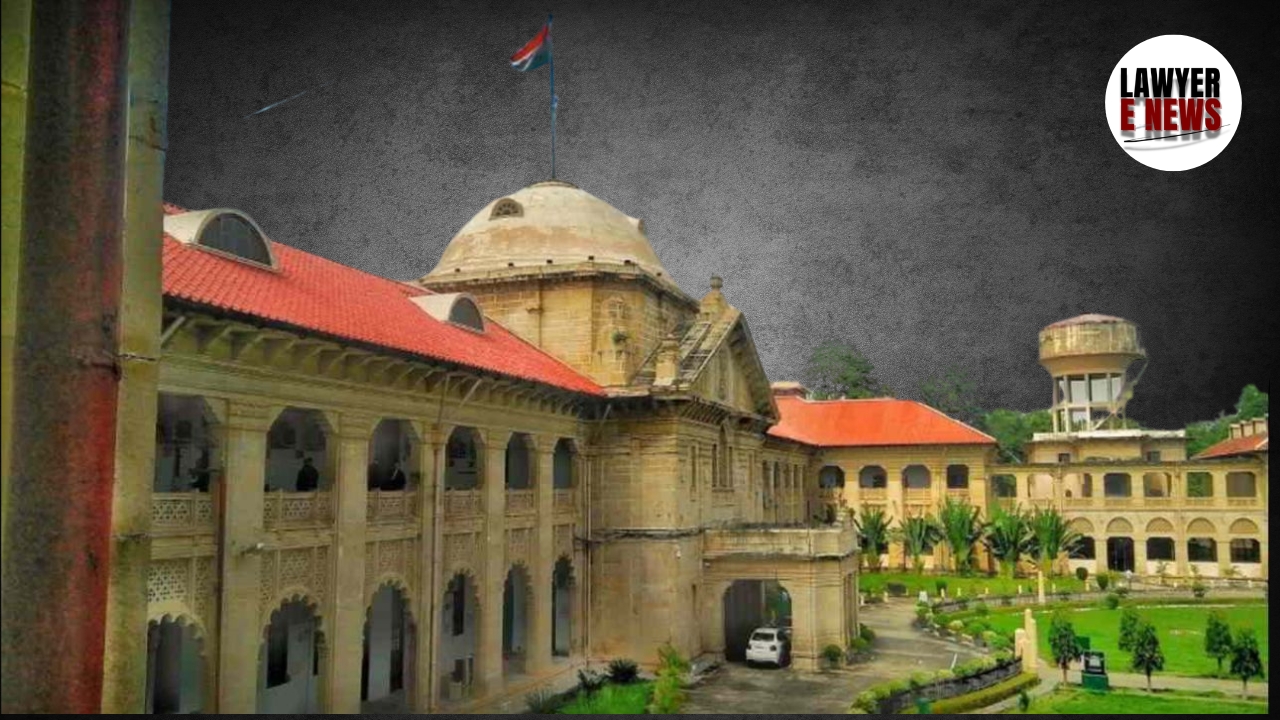-
by sayum
20 February 2026 8:24 AM



“District Magistrates Are Not Rubber Stamps — Mechanical Approval Without Joint Meeting Vitiates FIR Under Gangsters Act”, In a significant ruling that underscores the importance of procedural fairness in the application of draconian statutes, the Allahabad High Court (Lucknow Bench) on June 27, 2025, quashed an FIR registered under the Uttar Pradesh Gangsters and Anti-Social Activities (Prevention) Act, 1986. The Division Bench comprising Justice Alok Mathur and Justice Arun Kumar Singh Deshwal held that the invocation of the Act was vitiated by non-compliance with mandatory procedural safeguards, particularly the failure to record the District Magistrate’s satisfaction through an actual joint meeting with the Superintendent of Police, as required by law.
“The power conferred upon the State cannot be wielded as an instrument of harassment or intimidation… especially where political motivations may be at play,” the Court observed, highlighting that the Gangsters Act, being an extraordinary law that curtails personal liberty, must be invoked with utmost caution.
The petitioners, Shabbir Husain and Ali Husain, challenged the FIR dated 28.04.2025 (Case Crime No. 172 of 2025), registered at Police Station Bhira, District Kheri under Sections 2(b)(i) and 3 of the Gangsters Act. Their core contention was that the gang chart, a statutory precondition for initiating action under the Act, had been approved without the District Magistrate recording proper satisfaction, and that no joint meeting was held with the police authorities, violating Rule 5(3)(a) and Rule 16 of the Gangsters Rules, 2021.
The Court noted, “The District Magistrate merely endorsed the gang chart using the phrase ‘discussed with Superintendent of Police and Committee and proposal approved’. This kind of vague and mechanical endorsement is not just insufficient—it is unlawful.”
The central legal question before the Court was whether the mandatory procedural safeguards under the Gangsters Rules, 2021, had been followed before registering the FIR.
The Court categorically held that they were not, and that the failure to conduct a joint meeting and record satisfaction in explicit terms rendered the entire proceedings invalid.
Referring to its earlier judgment in Sanni Mishra @ Sanjayan Kumar Mishra v. State of U.P., the Court reiterated:
“While forwarding or approving the gang-chart, competent authorities must record their required satisfaction by writing in clear words, not by signing the printed/typed satisfaction… There must be material available for the perusal of the court which shows that the District Magistrate before approving the gang-chart had conducted a joint meeting with the District Police Chief.”
Despite a clear mandate from both the High Court and the Supreme Court, the authorities had shown blatant disregard. Citing the ruling in Abdul Lateef @ Mustak Khan v. State of U.P. , the Bench noted:
“Despite issuance of circulars by the Chief Secretary, Government of U.P., District Magistrates as well as District Police Chiefs are still not applying their mind in recording satisfaction… Defective gang charts continue to be prepared without due application of mind.”
The High Court further relied on the binding precedent of the Supreme Court in Vinod Bihari Lal v. State of U.P., where it was observed:
“It is painful that the authorities entrusted with the solemn duty of safeguarding the life and liberty of a person treated it in a very casual manner… The recommending, forwarding, and approving authorities are not mere rubber-stamping entities.”
It also referred to the judgment in Lal Mohammad v. State of U.P., where the apex court held:
“The constitutional guarantee of personal liberty acquires even greater significance when extraordinary legislation with stringent provisions, such as the UP Gangsters Act, is invoked… This discretion must be exercised judiciously, based on relevant considerations and not wielded as an instrument of harassment.”
The High Court was emphatic in noting that the failure of the District Magistrate to follow judicially mandated procedures was not an isolated incident. It observed that even after the issuance of detailed administrative guidelines on 02.12.2024, these continued lapses made it necessary for the Chief Secretary, Government of U.P., to reinitiate training for all competent officers under the Gangsters Act.
The Court ruled that the entire foundation of the FIR stood vitiated, as it was based on a gang chart approved without lawful procedure, and thus infringed Article 21 of the Constitution.
“From the perusal of the gang chart, it is clear that the District Magistrate has not conducted any joint meeting as required under Rule 5(3)(a)… The impugned FIR is liable to be quashed.”
The Court allowed the writ petition, quashed the FIR and gang chart, and further observed:
“The District Magistrate, Lakhimpur Kheri, approved the gang chart on 21.03.2025 in utter violation of the High Court and Supreme Court guidelines… It appears the training programme conducted by the State Government has had no effect.”
The Chief Secretary, Government of U.P., was directed to look into the matter and ensure proper sensitization and training of all District Magistrates regarding lawful invocation of the Gangsters Act.
Importantly, the Court clarified that the authorities would still be at liberty to initiate fresh proceedings under the Gangsters Act, but only after strict adherence to statutory rules and judicial directions.
The Allahabad High Court's ruling sends a strong message: Extraordinary statutes that severely affect personal liberty must be applied with judicial discipline, not administrative expediency. The invocation of the Gangsters Act, which was intended to curb organized crime, cannot be turned into a weapon for arbitrary or casual use by the executive.
The judgment reinforces that “due process is not a formality—it is the backbone of justice”. Without meaningful compliance with procedural safeguards, even the strongest laws will fall to constitutional scrutiny.
Date of Decision: 27 June 2025
